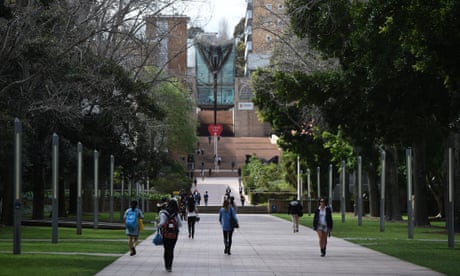- by foxnews
- 04 Mar 2025
Academics condemn government?s ?shortsighted? decision to veto research grants
Academics condemn government’s ‘shortsighted’ decision to veto research grants
- by theguardian
- 11 Jan 2022
- in news

Leading Australian academics have criticised the federal government for "political and shortsighted" research funding decisions, amid accusations of interference in awarding grants.
Research on climate activism and China were among six projects - all in the humanities - recommended for funding by the Australian Research Council but vetoed last month by the acting education minister, Stuart Robert.
The decision, announced on Christmas Eve, angered many in the research community, and has been condemned by hundreds of writers, academics and intellectuals in two open letters.
A petition with nearly 1,500 signatories, including those of high-profile authors JM Coetzee, Michelle de Kretser, Alexis Wright and Amanda Lohrey, has called for Robert "to reinstate the defunded projects and commit to legislating the complete independence of the ARC from government interference and censorship".
"That two-thirds of the six censored grants should be in literary studies demonstrates a dismissive attitude to the value of the imagination and creativity," it said.
"The actions of the government reveal that it is committed to defunding Australia's literary culture by overriding academic autonomy and determining what kinds of knowledge can and cannot be pursued. This is especially ironic given its recent campaign to defend freedom of speech on Australia's campuses."
The petition continued: "All political parties should refrain from treating literary studies or the humanities more generally as pawns to be used for political purposes. Literature lasts longer than governments, longer than parties, longer than electoral cycles."
In a separate open letter, published on Tuesday, eminent academics have called for the ARC to be "allowed to return to its core mission of funding fundamental curiosity-driven research without political interference".
The letter, addressed to Robert and Sue Thomas, the outgoing chief executive of the Australian Research Council, has been signed by more than 60 current and past Australian laureate fellows.
Laureate fellowships are awarded by the ARC to the most respected professors in their fields, with only 17 granted yearly. Among the letter's signatories is Prof Brian Schmidt, the Nobel prize-winning astrophysicist and Australian National University vice-chancellor.
The letter's signatories said they were "very concerned" about the way in which applications for the 2022 round of discovery projects grant funding had been handled.
After months of delays, successful discovery projects were announced on Christmas Eve, with 587 projects approved for funding out of 3,096 applications.
After being recommended through rigorous ARC processes, six projects were subsequently rejected by Robert on the basis that they did "not demonstrate value for taxpayers' money nor contribute to the national interest".
A spokesperson for Robert said the minister had approved "98.98%" of the 593 discovery projects the ARC recommended, but had not accepted the following six:
Prof Lynette Russell, a historian at Monash University and current ARC laureate fellow, described the minister's veto as "a significant constraint against academic freedom".
The letter said: "Whether it be the test of 'national interest' or an excessive focus on a sector like manufacturing, research funding in Australia is becoming political and shortsighted."
"The best return comes from letting researchers focus on curiosity-driven research. This has given us mRNA vaccines, the laser, and many other inventions that have lifted the quality of our lives."
The academics strongly recommend that in future the minister "accepts and approves funding for all ARC grant applications that pass through the tried, tested and rigorous peer review process".
ARC funding applications undergo an intensive review process which is led by a college of experts. "After really thorough debate by highly skilled, extraordinarily competent people, the decision is made whether or not to recommend for funding," Russell said.
"Our title is rather telling: we are a college of experts, and I think it's fair to say the minister is not," she said.
The letter also criticised the timing of the funding decision, with the announcement on Christmas Eve "giving an appearance that the date was chosen to avoid close scrutiny".
The announcement, which is usually made in October or November, came only eight days before 2022 funding was due to commence on 1 January.
Laureate fellow Prof Toby Walsh told Guardian Australia the timing was a "kick in the teeth" particularly for academics whose jobs in 2022 depended on their grants applications being successful. "That uncertainty in a very uncertain year doesn't really help the university sector," he said.
Days before the Christmas funding announcement, shadow education minister Tanya Plibersek had referred the ARC to the Australian National Audit Office to investigate an "unacceptable delay in announcing 2022 grant funding round outcomes".
In September, Greens senator Mehreen Faruqi also wrote to the auditor general requesting an audit into the ARC's funding application processes.
The council was roundly criticised in August for a rule banning applicants from citing preprint materials in grant proposals. The rule was later scrapped and affected applicants had an appeal upheld.
- by foxnews
- descember 09, 2016
Bus travel sees 'steady growth' as flyers seek alternative transportation
People who ride on airplanes might rely on alternative transportation for a number of reasons. A CEO of a bus travel company shares insights with Fox News Digital.
read more


